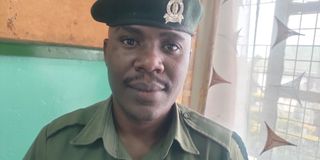At Nakuru GK prison exercise helps prison staff deal with mental health issues

Nakuru GK prison Public Relations officer Emmanuel Omollo.
We have all heard horror stories about what life in prison is like. Perhaps that is why most people do everything they can to avoid finding themselves on the wrong side of the law.
Now imagine having to go to work in a prison every day. This is the life of Emmanuel Omollo, a prison warden and public relations officer at Nakuru GK Prison.
He reports to work every day at 7am. His job involves many things, some of which include working on the monthly reports and filing them, as well as giving instructions to the other wardens.
In the prison there are different duties for the guards. There are those who are stationed at the gate to ensure security and who are also responsible for escorting visitors.
Being a correctional facility, the place is deprived of the luxuries of life, which he says sometimes affects not only the prisoners but also the guards.
"The job is inherently stressful and emotionally demanding as we are responsible for the protection and rehabilitation of offenders whose behaviour can be resistant, unpredictable and sometimes violent," says Mr Omollo.
Perhaps this is why, according to Mr Omollo, mental health problems among prison officers are on the rise.
"I have seen it many times where newly recruited prison officers come in with high expectations but when reality sets in and they find out that it is not what they thought it would be, disappointment and lack of hope creeps in," he said.
Other factors that contribute to mental health problems of prison officers include financial constraints and family and relationship problems.
"Financial constraints are also a challenge, especially for a prison officer who has a large family to support. The situation is more difficult for men as they are usually expected to 'man up', which is the reason for many suicides," he said.
"People think that police officers in general are inhuman, but most times we usually have empathy for the prisoners, we think of them as our own brothers or fathers," Mr Omollo said.
According to Charles Kimani, a mental health officer, out of 584 officers at the prison, 30 have come to him for help.
Most of the officers, he says, develop mental crises because of lack of awareness and not knowing what to do.
To ensure mental stability, Mr Kimani says he conducts a mental wellness exercise every month for both the 584 officers and the 2000 inmates.
"I engage the officers in physical exercise every day from 2pm to 4pm, this helps to put their minds in a state of relaxation," says Mr Kimani.
